
REPORT ERC EVENT 16 JUNE 2022
CONNECT TO ACT: Infrastructure optimalisation
WE CANNOT AFFORD TO DO NOTHING
Collaboration, cross border thinking, transparency and reinventing the industry were the buzz words that illustrated the widely felt joint urge to connect ánd act during our conference about infrastructure optimisation in Zeeland on 16 June. The hosts Siemens Energy, Dow and Smart Delta Resources managed to line-up a list of inspiring speakers sharing visions and real-life projects. The result? A highly energized audience ready to combat climate change.
In the Dow event center De Boerderij in Terneuzen presenters and audience agreed on the need for more and more collaboration to combat climate change. In his kick off presentation in the morning Andreas ten Cate (ISPT) described it as a system challenge demanding us to make choices. “Since we all compete for the same renewable power, the best way to approach this is through collaboration, bringing sources and users together in a regional approach”, he said. “It will take transition planning with clarity about who does what when, building on practices and tools, something ISPT is currently developing in the "Rekenkamer van de Industrie", to be launched soon”, he announced.
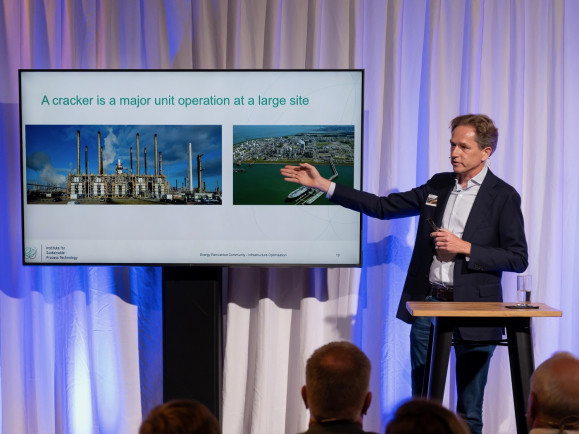
The respective focus group sessions in the morning shared insights and (regional) practices of developments in the areas of Offshore Energy, Digital Energy and CCS. Heat transition & Community Engagement had a primeur: for the first time focus group leads Sander de Jong and Susan Kimkes organised a joint session, integrating public support into discussions about heat projects. The cross fertilization approach worked, as George Wurpel (MSG Sustainable Strategies), Aaldrik Haijer (Water & Energy Solutions) and Kees Biesheuvel (Dow) brought together their learnings from stakeholder engagement and heat projects in the built environment and the industry. They agreed on ‘it is not a one size fits all’ playing field, each situation is different and requires a different approach to build community trust.
The Offshore Energy focus group, led by Rene Peters, talked about offshore system integration. Arjan Schipaanboord (North Sea Port) shared his experiences from a regional perspective, the North Sea Port. Saverio Ventrelli (Siemens Energy) described the integration of energy storage, power transmission and hydrogen to build off-grid and grid applications in relation to offshore wind. Hugo Groenemans (Hygro) presented integrated wind and electrolyser concepts, comparing centralized electrolysis with hydrogen production turbines. Jos Leo (OpenWater Energy) talked about the value of smart cryogenic terminals, floating systems functioning as terminals suited for LNG, LPG and ammonia.
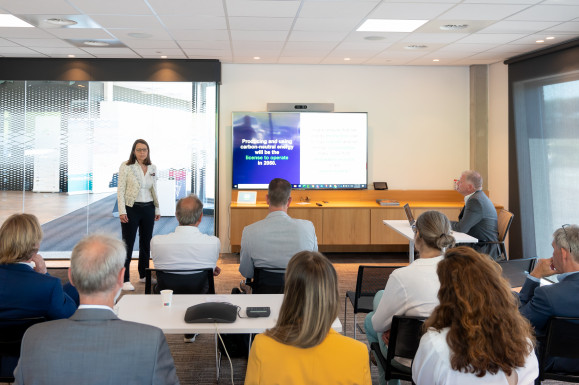
In the Digital Energy focus group, led by Jan Prins, Petra Michalke (Siemens Energy) shared her views on the growing need for certification of clean energy, ensuring that energy imports and energy consumption really come from renewable sources or are carbon-neutral. Maurits Romme (Nobian) talked about the sense of flexible operating options as part of the e-Flex approach of Nobian’s roadmap to carbon neutral chemical processes. Doug McKnight (Dow) talked about the digital manufacturing strategy of Dow, including a range of tools and technologies relevant for the decarbonisation transformation.
The CCUS focus group for this occasion led by Martijn Verwoerd (Smart Delta Resources), discussed a variety of current and future projects in the CO2 value chain. Using Carbon Connect Delta as an example, Martijn described how this will provide speed, flexibility and volume aggregation in the full chain to create feasible regional infrastructure. Ellen Kruiten (Dow) shared Dow’s journey of transformation at the Dow complex in Terneuzen, with CCS as a critical part of this multi-generation roadmap. Guus Vogels (Vopak) presented two projects, CO2next and ORCA. These terminals are part of the CCS infrastructure for the reception, storage and delivery of CO2, either for permanent storage or (in the future) for reuse purposes, essential infrastructure to achieve the national climate agreement and the plans of the European Green Deal.
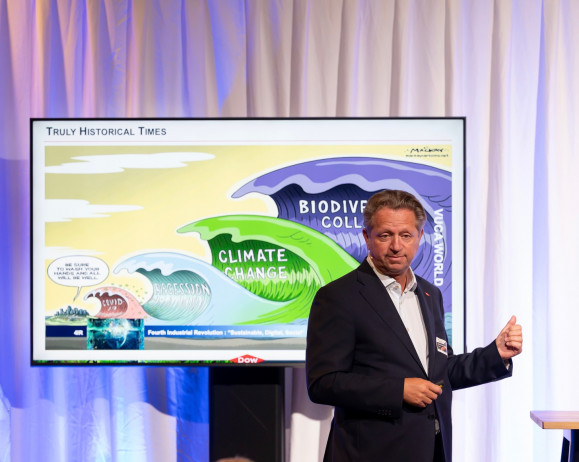
In the afternoon session moderator Sofie van den Enk, invited Anton van Beek (Dow) to kick off. He described how Dow in its 125 years existence reinvented itself several times and how they want to continue the supply of products society uses, but with less CO2 emissions and circularly made. Adam Middleton (Siemens Energy) made a strong case for collaboration. “To combat climate change we must work together, with current and new partners and competitors”, he said. “Communities such as ERC are exactly what we need to drive these collaborations, with the openness, transparency and speed we need”, he complimented ERC members.
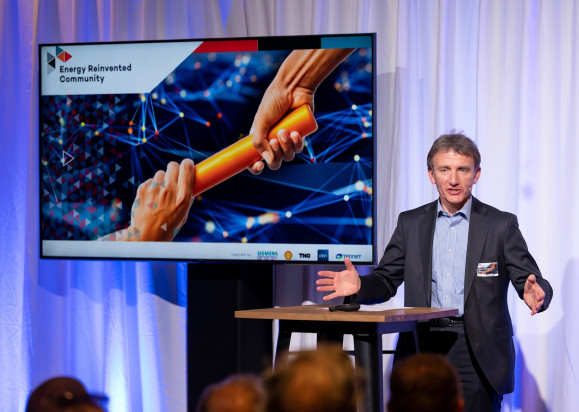
Jan van der Lee (TenneT) argued that electrification requires system integration. “Industry, mobility, built environment, they all rely on the same power grid, there is simply no other option”, he said. “You are more flexible than you think”, he challenged industry representatives in the room.
Rolf Schumacher (HIF Global) and Markus Speith (Siemens Energy) presented the Haru Oni project in Chile as a real life example of sector coupling. We should produce renewable energy in global areas that produce the most energy, was their message.
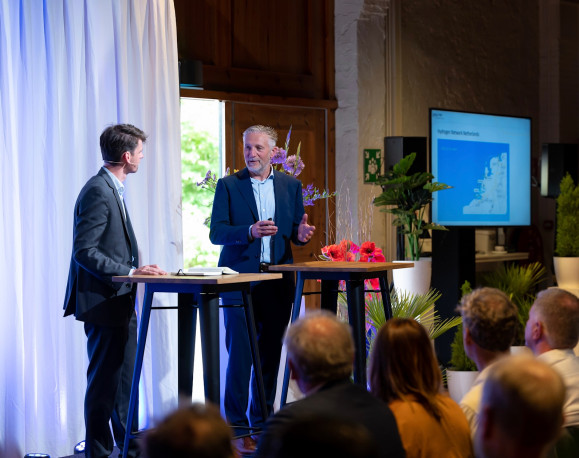
Steven Engels (Ørsted) and Guido Custers (Gasunie) presented the SeaH2 land project. The idea is to build a virtual roundabout for hydrogen in the Netherlands, they explained. The project will reuse about 85% of gas pipelines they responded to one of the many questions and suggestions from the audience.
In his presentation Eric de Coninck (ArcelorMittal) illustrated project examples for carbon neutral steel production, while describing three pathways to reduce CO2 emissions: 1. Increase renewable electricity, 2. Change production ways 3. Continue traditional production but reduce the CO2 in the process.
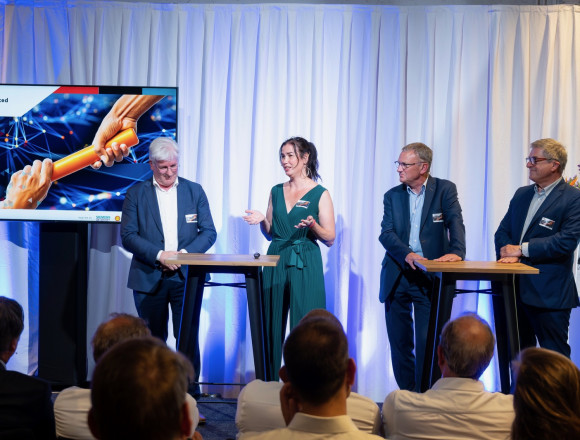
The panel, consisting of Ira von Harras (Vereniging Zeeuwse Milieufederatie), Eric de Coninck (ArcelorMittal), Daan Schalck (North Sea Port) and Erik Van Merrienboer (Mayor Terneuzen), discussed cross border collaboration. They agreed that the energy transition does not stop at the border and we need to start acting. “We need to put our money where our mouth is, to get the real solutions”, Daan Schalck said. Erik van Merrienboer and Ira van Harras pleaded to include society. This is a social transition, we cán make it happen, but only if industry and government design a future perspective for society ánd include communities to take part in the energy transition. As Ira von Harras described it: “Involve the community, be not judgemental, and take concerns seriously. We cannot afford to do nothing!” Restoring trust should be a priority the Mayor concluded, while Ira extended the invitation to initiate joint discussions about our returns to the earth.
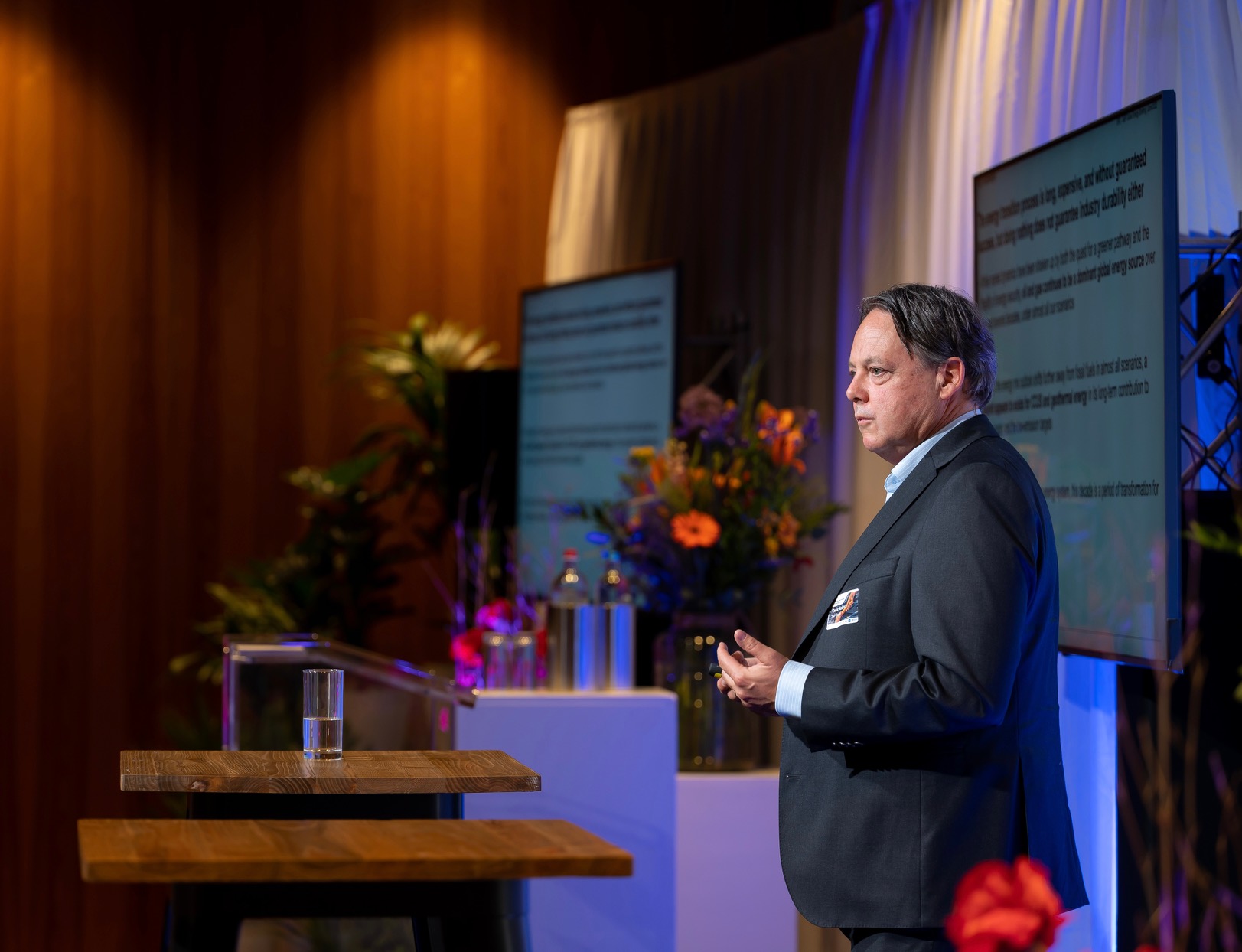
Key note speaker Oscar Abbink (S&P Global), described several scenario’s on energy demand. In the last three decades energy demand doubled, but we can expect it that the growth will slow down. Nevertheless, oil and gas will remain dominant in the next 30 years. Therefore oil & gas corporations need to start thinking about their (re)position. Some of them are well on their way, but some of them still need more thinking.
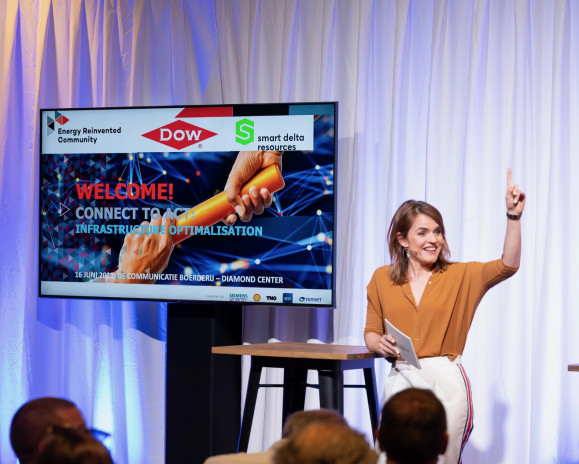
We cán make it happen!
All presentations as well as a summary video of the day and the photos taken can be found at the website www.energyreinventedcommunity.com. Login with your personal login code. Go to FORUM, select EVENTS and select 2022-06 "CONNECT TO ACT - OPTIMALISATION INFRASTRUCTURE ".
Looking forward to meeting you again on our next event on 10 November, CONNECT TO ACT - EMPOWERING INDUSTRY.





